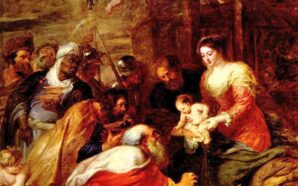Homily for the First Sunday of Lent, Year B
Readings: Genesis 9:8-15; Psalm (24)25:4-6, 7b-9; 1 Peter 3:18-22; Mark 1:12-15
18 February 2024
Lent has begun. We hear again those opening words of Jesus in Mark’s gospel: “This is the time of fulfilment. The kingdom of God is at hand. Repent, and believe in the gospel.”
In the first reading from Genesis, we envisage the beautiful and reassuring image of the rainbow after cleansing rains. In light of the Flood and the survival of Noah’s family on the ark, Yahweh declares: “I set my bow in the clouds to serve as a sign of the covenant between me and the earth.” In the second reading from the first letter of Peter, the writer describes the Flood as prefiguring “baptism, which saves you now. It is not a removal of dirt from the body but an appeal to God for a clear conscience, through the resurrection of Jesus Christ”.
LISTEN: https://soundcloud.com/frank-brennan-6/homily-18224
Scripture scholars Donald Senior and Daniel Harrington tell us: “Transformed by the redemptive power of Christ in baptism, the interior life of the Christian is purified and illumined, becoming conscious of God and directing the full attention of one’s life and thought to the divine presence.” This “profound interior disposition … enables the Christian to endure external threat and suffering.”[1]
Called to repentance, we know that there is plenty wrong with us and our world. Many things are out of kilter or failing to reach their potential. But we are consoled to know that the Lord is with us, and will not abandon us.
This past week, the Irish celebrated the requiem mass for their past Taoiseach John Bruton. He was prime minister from 1994 to 1997 and leader of his party from 1990 to 2001. He had been Minister for Finance back in the 1980s when the Celtic Tiger came to life.
The London Tablet observed: “The eulogies acknowledged his decency and good humour, and his part in unleashing the Celtic Tiger and laying the foundations for the peace process. What few noticed was the ground beneath Bruton’s feet: a cleareyed but unshowy Catholic faith. It coloured everything he was and did.”[2]
The homily at the requiem Mass was delivered by Fr Bruce Bradley SJ who knew Bruton and his family well.[3] Bradley had been rector at Clowgowes Wood when Bruton’s son attended the Jesuit school as had Bruton himself. Referring to the many fine eulogies that had been delivered, Bradley said: “These accounts celebrate a very gifted and genuinely likeable man who enjoyed a varied and successful career, more than enough to fill many columns. But anyone who knew him in a closer way realised that, underneath everything, he was a seriously religious man and this all-important aspect of his life and self-identity is largely missing from the public commentary. There is a temptation in our culture just now to ignore this aspect of people’s lives, as if it were too marginal or too private and embarrassing to bring up in public or as having too little to do with the real world.”[4] The same could be said of our Australian culture.
I had cause to be reflecting on these words while accompanying Fr Tomáš Halík on his Australian speaking tour this past week.[5] Halík, the internationally renowned theologian from Prague, kept emphasising that we Christians believe in a God who manifests Himself in the dynamics of nature and history. Human life and human history are a stream of events. We reflect on our experience and determine how to integrate that experience, good or bad, into our life. For Halík, “Faith, love, and hope are how people interpret and co-create the stream of life. Faith, love, and hope are places of the interpenetration (perichoresis) and interplay of God’s grace with human freedom, creativity, and responsibility.”
Fr Bradley summed up John Bruton’s life with disarming simplicity: He “knew what he was doing here. John knew the larger journey we are all on. His life itself spoke that.”
Lent is a time for each of us to contemplate the rainbow – that abiding promise that the Lord is with us, and always will be. It is a time to review our life, asking ourselves what we are doing here, how are we responding with faith, hope and love to the people around us and the situations in which we are placed.
During his homily, Bradley referred to a 2013 interview by the great Irish poet Seamus Heaney in a series entitled Interviews from a Changing Ireland. Heaney said: “[The] biggest shift in my lifetime has been the evaporation of the transcendent from all our discourse and our sense of human destiny”. “More bewildering still”, he added, elaborating on what “the evaporation of the transcendent” means for a person’s inner life, “is exile into a universe with no up or down, no internalized system of moral longitude or latitude, no sense of a metaphysical roof over our heads”.
Bradley interpreted this as a “growing lack of any ultimate framework or structure of meaning for our lives, or any reliable moral compass. Our culture of what has been well called ‘continuous partial attention’, secularisation and the decline of religious practice and self-understanding it tends to bring, allied to the anxiety and disorientation of our times. People are tempted to focus on the immediate, because they feel they can have no larger perspective on their own lives.”
Lent is a time for time out – renewing, regaining or salvaging that larger perspective on our lives, like when we view the complete rainbow in the sky after the cleansing rains. It’s a time for re-orienting ourselves to a universe with an up and a down, for re-discovering that internalised system of moral longitude or latitude, and for seeking shelter under the metaphysical roof over our heads.
Let us pray for that “clear conscience, through the resurrection of Jesus Christ”:
Your ways, O Lord, are love and truth to those who keep your covenant.
Your ways, O LORD, make known to me;
teach me your paths,
Guide me in your truth and teach me,
for you are God my saviour.
R. Your ways, O Lord, are love and truth to those who keep your covenant.
Remember that your compassion, O LORD,
and your love are from of old.
In your kindness remember me,
because of your goodness, O LORD.
R. Your ways, O Lord, are love and truth to those who keep your covenant.
Good and upright is the LORD,
thus he shows sinners the way.
He guides the humble to justice,
and he teaches the humble his way.
R. Your ways, O Lord, are love and truth to those who keep your covenant.
From the start of 2024, Fr Frank Brennan SJ will serve as part of a Jesuit team of priests working within a new configuration of the Toowong, St Lucia and Indooroopilly parishes in the Archdiocese of Brisbane. Frank Brennan SJ AO is Adjunct Professor and Distinguished Fellow of the PM Glynn Institute, Australian Catholic University. He is a former CEO of Catholic Social Services Australia (CSSA) and his latest book is An Indigenous Voice to Parliament: Considering a Constitutional Bridge, Garratt Publishing, 2023.
[1] Donald P. Senior and Daniel J. Harrington, 1 Peter, Jude and 2 Peter, Sacra Pagina Series (Collegeville, MN: The Liturgical Press, 2003), 110.
[2] The Tablet, 17 February 2024, p. 15.
[3] See https://www.rte.ie/player/series/state-funeral-of-john-bruton/10003905-00-0000?epguid=IH10003904-24-0001
[4] https://www.anglocelt.ie/2024/02/10/state-funeral-for-john-bruton-takes-place-in-dunboyne/
[5] See https://www.youtube.com/watch?v=XXoccU0We8o








